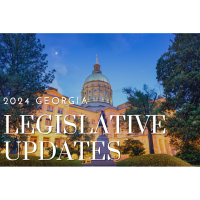Georgia General Assembly members were back under the Gold Dome in Atlanta this week for the start of the 2024 Legislative Session. Legislators were in session Monday through Friday this week for Legislative Days One through Five. The House and Senate will not be in session next week so that the Appropriations Committees can hold their AFY24 and FY25 budget hearings.
The Senate was down from 56 to 55 members when they convened this week. Senator Mike Dugan (R-Carrollton) resigned his seat on January 4th to run for Congress. In the House this week, Representative Barry Fleming (R-Harlem) resigned after Governor Kemp appointed him to serve as a superior court judge in Columbia County. Special elections to replace Senator Dugan and Representative Fleming have been set for February.
For the second year in a row, the House and Senate have come to an agreement on a full 40-day session calendar. On Thursday morning, Majority Leader Chuck Efstration introduced House Resolution 779, the Legislative Session Adjournment Resolution. Crossover Day, which is the latest day a bill can be voted out of the chamber in which it originated, is set for February 29th. The final day of the 2024 session will be March 28th.
On Wednesday of this week, the Georgia Chamber of Commerce held its annual Eggs and Issues breakfast, which provides some insight into the legislative priorities of the Governor, Lieutenant Governor, and Speaker for the upcoming session. In his remarks, Speaker Burns discussed certificate of need modernization, pay raises for law enforcement, safety-related grants for public schools, and increased investment in pre-K education. He also touched on legislation that would moderate social media use for children, as well as an already-unveiled proposal to further decrease the state income tax from 5.75% to 5.39%.
Lieutenant Governor Burt Jones emphasized school choice, increasing access to healthcare in rural Georgia, as well as legislation his team is working on that would cut back on red tape for small businesses. Governor Kemp announced several of his major budget recommendations at Wednesday’s breakfast, including $1.5 billion for GDOT projects that directly help move commuters and freight across the state; $250 million for water and sewer projects across the state; $178 million for the design and construction of a new dental school at Georgia Southern; and $50 million for the creation of a medical school at the University of Georgia.
Another important event that takes place during the first week of the session is the annual State of the State Address, which Governor Kemp gave in the House chamber on Thursday morning. In his address, Governor Kemp discussed the proposed state income tax cut, which he noted would save Georgia taxpayers $3.5 billion over the next ten years. He also rolled out his budget proposal for a four percent pay raise for all state employees, including teachers, as well as an additional $3,000 pay raise for law enforcement following last year’s $6,000 pay raise. Other major budget recommendations Governor Kemp discussed in his State of the State Address include $500 million to shore up the state retiree fund; $104 million for school safety enhancements; and a $205 million increase for DBHDD for mental health services in the state. Other priorities the governor touched on in his address included school choice, continuing to fight human trafficking, and a proposed peace officer loan repayment program, which was introduced last legislative session.
After budget hearings next week, legislators will be back in session for Legislative Day 6 on Monday, January 22nd.
This weekly Legislative Update report is courtesy of the Regional Business Coalition of Metropolitan Atlanta (RBC), an organization of over a dozen of the largest and most active Chambers of Commerce throughout the metro Atlanta region. RBC member chambers represent over 15,000 member companies who employ millions of metro Atlanta residents. The RBC’s primary goal is to represent the interests of RBC Chamber members on regional public policy issues impacting our transportation, water and air quality and to advocate for solutions that improve metro Atlanta’s quality of life and economic vitality.
DeKalb Chamber of Commerce
Frankie Atwater President & CEO


